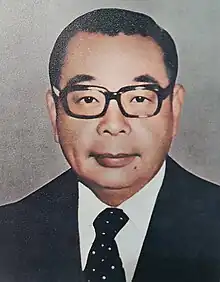1978 Taiwanese presidential election
Indirect elections were held for the presidency and vice-presidency of the government of the Republic of China on Taiwan on March 21, 1978. The vote took place at the Chung-Shan Building in Yangmingshan, Taipei. Premier Chiang Ching-kuo, son of former President Chiang Kai-shek, was elected as the President with Governor of Taiwan Province Hsieh Tung-min who became the first Taiwan-born Vice President.
| |||||||||||||||||
| |||||||||||||||||
| |||||||||||||||||
Incumbent President Yen Chia-kan who succeeded Chiang Kai-shek who died in office in the capacity of Vice President in 1975 decided not to seek for re-election to make way for Chiang King-kuo, son of Chiang Kai-shek and the then premier and chairman of the Kuomintang.
Electors
The election was conducted by the National Assembly in its meeting place Chung-Shan Building in Yangmingshan, Taipei. According to the Temporary Provisions against the Communist Rebellion, National Assembly delegates elected in the following elections were eligible to vote:
- 1947 Chinese National Assembly election,
- 1969 Taiwanese legislative election, and
- 1972 Taiwanese legislative election.
In total, there were 1,220 delegates reported to the secretariat to attend this sixth session of the first National Assembly.[1]
Results
President
| Candidate | Party | Votes | % | |
|---|---|---|---|---|
| Chiang Ching-kuo | Kuomintang | 1,184 | 100.00 | |
| Total | 1,184 | 100.00 | ||
| Valid votes | 1,184 | 98.34 | ||
| Invalid/blank votes | 20 | 1.66 | ||
| Total votes | 1,204 | 100.00 | ||
| Registered voters/turnout | 1,220 | 98.69 | ||
| Source: Schafferer[2] | ||||
Vice president
| Candidate | Party | Votes | % | |
|---|---|---|---|---|
| Hsieh Tung-min | Kuomintang | 941 | 100.00 | |
| Total | 941 | 100.00 | ||
| Valid votes | 941 | 79.14 | ||
| Invalid/blank votes | 248 | 20.86 | ||
| Total votes | 1,189 | 100.00 | ||
| Registered voters/turnout | 1,220 | 97.46 | ||
| Source: Schafferer[2] | ||||
See also
References
- 第一屆國民大會第六次會議實錄
- Christian Schafferer (2003) The Power of the Ballot Box: Political Development and Election Campaigning in Taiwan
